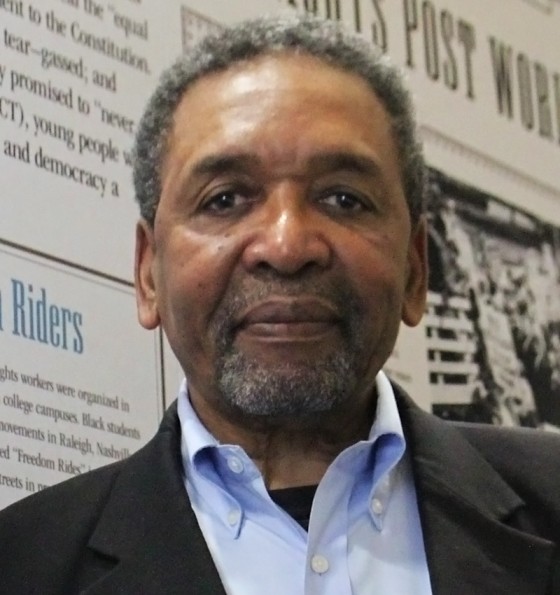Shadow Politics

Shadow Politics is a grass roots talk show giving a voice to the voiceless. For more than 200 years the people of the Nation's Capital have ironically been excluded from the national political conversation. With no voting member of either house of Congress, Washingtonians have lacked the representation they need to be equal and to have their voices heard. Shadow Politics will provide a platform for them, as well as the millions of others nationwide who feel politically disenfranchised and disconnected, to be included in a national dialog.
We need to start a new conversation in America, one that is more inclusive and diverse and one that will lead our great nation forward to meet the challenges of the 21st century. At Shadow Politics, we hope to get this conversation started by bringing Americans together to talk about issues important to them. We look forward to having you be part of the discussion so call in and join the conversation. America is calling and we're listening… Shadow Politics is about America hearing what you have to say. It's your chance to talk to an elected official who has spent more than 30 years in Washington politics. We believe that if we start a dialog and others add their voices we will create a chorus. Even if those other politicians in Washington don't hear you — Senator Brown will. He's on a mission to listen to what America has to say and use it to start a productive dialog to make our democracy stronger and more inclusive. If we are all part of the solution we can solve any problem.
Guest, Frank Smith Jr

Frank Smith, Jr. is a civil rights activist and politician in Washington, D.C., and an advocate for DC Statehood. He was born in Newnan, Georgia, he attended Morehouse College where he developed his appetite for activism. In 1960, he participated in the Rich's Department Store boycotts in Atlanta; and almost at the same time he was working with other students to establish the Student Nonviolent Coordinating Committee (SNCC). A founding member of SNCC, he is recognized by his SNCC peers as the first SNCC worker sent into Mississippi to register voters. Based in Holly Springs, Mississippi, he worked in some of the most brutal and racist counties in Mississippi. He was also one of the few SNCC workers employed in the original HeadStart program. Working with the Child Development Group of Mississippi (CGDM), his Headstart Program was based in Jacksonville, Mississippi, in the heart of the Mississippi Delta. Frank worked with native Mississippi sharecroppers who had been evicted from their homes when they requested a pay raise in the men’s salaries from a flat rate of $6 day to $1.25 an hour. The sharecroppers, Frank and his first wife, Jean Smith, purchased land, lived in tents where they were regular and ongoing targets for the plantation owner and friends during the year when they built housing, and established one of the first (and only) black cooperative communities in Mississippi—Strike City.
As part of Freedom Summer, Frank Smith and Frank Soracco, another SNCC worker, travelled the United States to raise funds for travel and expenses for the Mississippi Freedom Party and his friend and colleague, Fannie Lou Hamer to attend the 1964 Democratic National Convention. With the help of Vice President Hubert Humphrey and Party leader Walter Mondale, Johnson engineered a "compromise" in which the national Democratic Party offered the MFDP two at-large seats, which allowed them to watch the floor proceedings but not take part. The MFDP refused this "compromise," which permitted the undemocratic, white-only, regulars to keep their seats and denied votes to the MFDP. While they were unsuccessful at being seated, their presence and Ms. Hamer’s testimony led to the passage of the Voting Rights Act of 1965.
After leaving Mississippi, Frank Smith relocated in Washington, DC, where he continued his service to community. Frank was elected to the D.C. Board of Education in 1979; and subsequently to Council of the District of Columbia in 1982 where he served for sixteen years. His work focused on housing and economic development. While on the Council, he served as chair of the Housing and Economic Development Committee, the Metropolitan Washington Area Transportation Authority and the Baseball Commission. As a councilmember he shared his passion for gardening by introducing legislation to maintain the original victory gardens and allow DC residents to garden on vacant, District-owned properties. He has been in the vanguard of urban housing activities, setting up the original Neimiah project in the District of Columbia; and introducing legislation for urban homesteading. He also served as Chair of the DC Housing Authority. Smith's office records from his time as a DC City Councilmember are currently under the care of the Special Collections Research Center at The George Washington University.
After his stint with the Council, he focused on his passion – African American history—and found funding to build the African American Civil War Memorial, establish a nonprofit which supports the African American Civil War Museum. Smith is the Founding Executive Director and Board member of the African American Civil War Memorial Freedom Foundation and Museum.










Jacksonville, Mississippi?
I'm a lifelong native of Mississippi. Was wondering if Mr. Smith has come back recently. There is no Jacksonville, Mississippi in the Delta. Could you mean Jackson, but Jackson is central Mississippi?